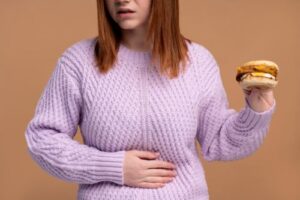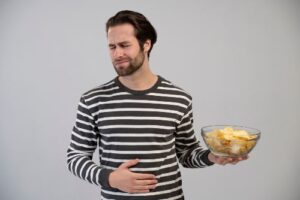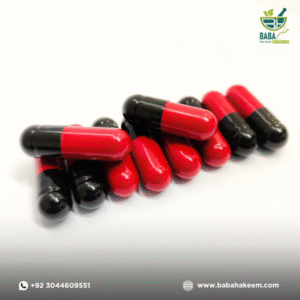You have probably noticed the stomach pain after eating, right? The sensations of burn, bloat, and even pain are often familiar feelings after eating for many. The article will help you to get a knowledge of why these Stomach issues after eating occur.
Your stomach generates digestive enzymes to digest the food and absorption of nutrients. The Balance of that digestive juice may be disturbed and it leads to stomic pain. They can be mild annoyances or very painful experiences that may result in many different ways.
Common causes of stomach issues after eating
When you have more food than your stomach can hold, it causes indigestion, and discomfort. Fast eating causes stomic pain because they do not allow your body to digest the foods properly.
One more reason is the eating of hot and greasy food. Such products may annoy the lining of your stomach, leading to Stomach issues after eating. Also, some food intolerances or allergies can lead to stomach problems when eating. It is always helpful if the foods you consume regularly cause you to have health problems. If you have intolerance or allergies, you can keep them off your menu.
Upper stomach pain after eating: Possible reasons
If you have upper stomach pain after eating, it might indicate a more serious condition. Maybe discomfort is due to the occurrence of acid reflux which happens when the contents of the stomach flow back into the esophagus. It can result in a burning sensation in the chest and upper abdomen. Another prospective trigger is gastritis, which is an inflammation of the stomach wall.
In worse cases, stomach pain after eating may be a symptom of a certain disease of the upper stomach, such as peptic ulcers or gallstones. If you suffer from pain that can’t be changed by medication and your symptoms become worse, you should immediately contact a medical professional for a diagnosis and treatment.
Foods to avoid for a Lower Stomach Pain after eating
Changing your diet will drastically reduce your digestive issues and might even help you to suffer less from Lower Stomach Pain after eating. In the beginning stage, it would be good to avoid foods that cause these symptoms.

Spicy foods, oily foods, and fatty foods also can cause Lower Stomach Pain after eating. Limit your intake of such foods and opt for healthier food options.
Carbonated beverages, just like soda and sparkling water, can also cause Lower Stomach Pain and gas. These drinks are filled with air and cause abdominal discomfort. You should choose to drink non-carbonated beverages or water as the only best way to stay hydrated.
Fiber-rich foods can also at times be difficult to digest, and if your body is not accustomed to them it can be even harder for you to digest them properly. Fiber should be part of a healthy diet, it’s necessary to add it slowly and consume large amounts of water to help the digestive system.
Natural remedies to soothe stomach issues after eating
The Lower Stomach Pain after eating can be relieved using some simple natural remedies that can help reduce the discomfort. One of the most popular remedies is ginger. The anti-inflammatory properties of ginger can limit inflammation of the stomach. There are different ways to eat ginger, including ginger tea or garnishing fresh ginger in your meals.
Mint is also a natural remedy that can offer substantial, soothing effects. Peppermint helps relax the muscles in the gut and stops the intestine from spasming and easing digestion. You can drink a normal cup of peppermint tea or chew on peppermint leaves to feel the benefits.
Probiotics are very important in calming Stomic Pain. Probiotics are live bacteria that have a positive impact on gut fauna and digestion. Probiotics can be taken in the form of foods such as yogurt or you can take supplements.
Lifestyle Changes for Stomic Pain
Apart from diet alterations, many lifestyle adjustments can work to remember your digestion and reduce the stomach pain after eating. Take small meals several times per day, rather than large, heavy meals. This is beneficial to your digestive system as it makes it work more effectively and prevents Stomic Pain.
Chewing is an important habit. By chewing your food properly, you’re facilitating the digestion process and hence, it’s easy to break down the food in your stomach. Try to chew every bite at least 20 times before you swallow it.
Balancing stress is also a necessity for a proper working digestive system. Stress can hinder the ability of your digestive system to work properly and lead to Upper Stomach Pain after eating. This can also mean practicing activities like yoga, meditation, or just spending time in nature.
When to seek medical help for stomach issues after eating
Digestive symptoms that are caused by eating can be controlled by dietary and lifestyle modifications, there are other times when you have to see a doctor. If you have recurring symptoms of stomach pain, vomiting, or blood in your stool, you should consult with a healthcare professional. These symptoms can be symptoms of a serious disease that may require medical help. A healthcare professional can make you go through necessary diagnostic tests, and diagnose your condition. After diagnosis, he can provide you with a treatment plan that suits your case.
Prevention tips for avoiding stomach issues after eating
Prevention is always better than cure so you must follow some tips to not get a stomach problem after you have had

a meal. Firstly, regulate the portion size and stop overeating. Hear your stomach growl for food. When you’re full, not overly full, stop eating.
It is also important to eat slowly and chew your food carefully. This way you are allowing your body to do the proper digestion and also reduce the chances of having stomach problems.
Consuming natural foods and including a variety of fruits and veggies in your diet can likewise end up increasing your immunity. These foods are a great source of fiber, vitamins, and minerals which boost the health of your digestive system.
Healthy eating habits for a happier stomach
Last but not least, practicing such eating guidelines will help us to have a happier belly. Practice consuming regular meals and don’t go without eating for a long period, otherwise, this will cause disruption of the digestive system and lead to overeating. Rather than the idea of eating three square meals, go for frequent meals and snacks so that you maintain your metabolism and digestion.
Water plays another significant role in the digestive system as well. Drinking water during the day is important as it keeps the digestive juices moving and prevents constipation.
Exercise with normal work will also help you get a better digestive system. Exercise is a great aid for exercising the muscles in your digestive system, which in turn facilitates more efficient digestion and prevents stomach-related problems.
Conclusion
Post-meal syndrome is painful but with the right knowledge and cures, you can gain relief from these problems. You can soothe your Upper Stomach Pain after eating and appreciate pleasant, healthy digestion by changing your dietary patterns and lifestyle. Pay attention to the types of foods you consume, and how you eat them to have prosperous health.



